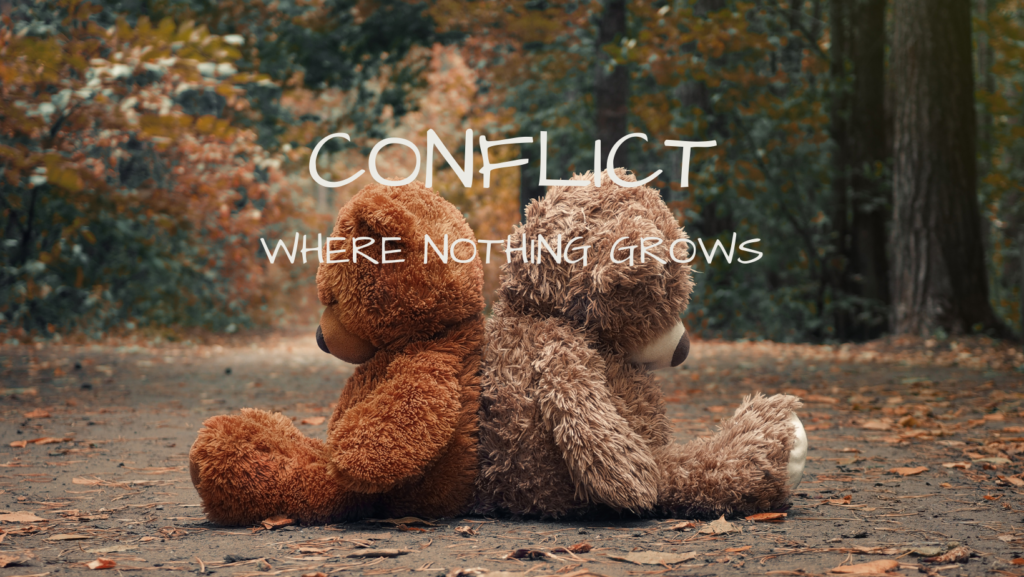
Can’t we all just get along?
Have you ever wondered “How can our organization function as a team if they can’t even get along with each other?” Let me assure you, this is very common in all relationships – friends, family, co-workers, and teammates. In our world today, there are plenty of ways to find disagreement among people if you just consider differences in personal, political, emotional, and religious beliefs. We are all one big population of humanity so there is bound to be differences but also common ground.
Conflict in the Workplace
In the workplace in particular, conflict can be tricky and nonproductive. It can impact the social-emotional climate of an organization and taint its culture. Conflict can also feed into building an internal and external reputation that a leader may have to manage as conflict and can impact employee recruitment and retention.
In my experience as a leader, conflict often occurs between parties when there is a lack of information; disagreement on perspective; issues surrounding respect, personalities, and or relationships; and/or general lack of communication skills.
Confrontation Solution
How do you mitigate conflicts that arise if your life or workplace? Confrontation. Right?
Let’s think about that. Confrontation can be an expedient way to solve conflicts but can leave scars, wounds, and general hurt feelings. There are definitely situations when confrontation is needed and required, but if you use it all of the time, you may be overreacting to something that could have been solved differently. I like to say, “If the only tool you have in your toolbox is a hammer, then you’re more likely to think everything is a nail.”
Conflict Resolution – a Healthy Alternative
An alternative to direct confrontation can be conflict resolution. Although, conflict resolution is not meant to be “soft” or “easy”, to be effective, you may find it difficult and hard. Let’s take a deeper dive into conflict resolution an discover how this may be able to work for you.
Conflict resolution is generally the process that is used in assisting parties to find peaceful resolution to a disagreement or to repair a relationship. Conflict resolution is an important skill for leaders to possess and frankly, a must have to be present in your leadership tool kit.
As a leader, you will want to have a process to use and the ability to practice your skills with courage and confidence.
Pro tip – Never be afraid to write down (form a plan) of your conflict resolution process and always find ways to practice your skills.
How do we resolve conflict?
Below are a few of the practices that I use in my leadership role to solve conflict.
- Identify the problem (the conflict). This is important because not all problems are handled the same way
- Find the root cause or underlying factors of what needs to be solved
- Lead your staff to agreements and common ground (no matter how small):
- Communicate the process of conflict resolution that you are about to use and have all parties agree to the process and to show respect to all
- Each person needs to communicate their side
- Each person needs to, politely and without interruption, listen to understand
- All should you use “I” statements instead of “you” statements
- As the leader, give grace where you can
- Find a mutual solution-resolution based on common ground and goals
Pro-Tip – As the leader, time is on your side. You can always adjourn for a bit to let emotions cool down and re-convene. This also gives you a chance to process what is said a formulate an appropriate response.
Not all conflicts occur between two or more parties with you as the leader on the outside. How should you handle when the conflict occurs with an employee or team and you?
- Be clear with your expectations and how you expect to be treated
- Be clear on how the employee (team) will be treated and what the employee (team) can expect from you
- Let the employee (team) speak and you as the leader…” listen to understand before being understood”
- All should you use “I” statements instead of “you” statements
- Check your (the leader’s) ego at the door
- Be up front in providing constructive feedback while being acceptant of feedback as well
- Always try to maintain a relationship
- Leave with a clear plan to move forward and/or work for a mutual solution
As a best practice, you may want to consider these suggestions in advance:
- Have a script or agenda for these types of meetings so you can stay on message or keep the meeting objective at the top-of-mind
- Find a person who you can process your plan with and to debrief with after you have met with someone or had a conflict resolution session
How to get help managing conflict?
I hope you will have a smooth experience as a leader but know, through my own experience, preparations for all possible outcomes will ensure better success for you and your organization while lowering the stress-level for you and those your lead. Impactful leaders are constantly learning and improving their own skill sets.
How will you commit to becoming better at conflict resolution? Who will you seek out for guidance?
At Everyone Thrives Consultant Services, we can support your desire to learn about better ways to solve challenges that impact your company, organization, or team. Just reach out and connect.
There are many resources on the internet but her couple of good books that I suggest you read that address team and relationship building strategies and touch on conflict resolution:
- “Becoming a Peaceful Powered Leader” by Jared Narlock
- “The Five Disfunctions of a Team” or “The Ideal Team Player” by Patrick Lencioni

